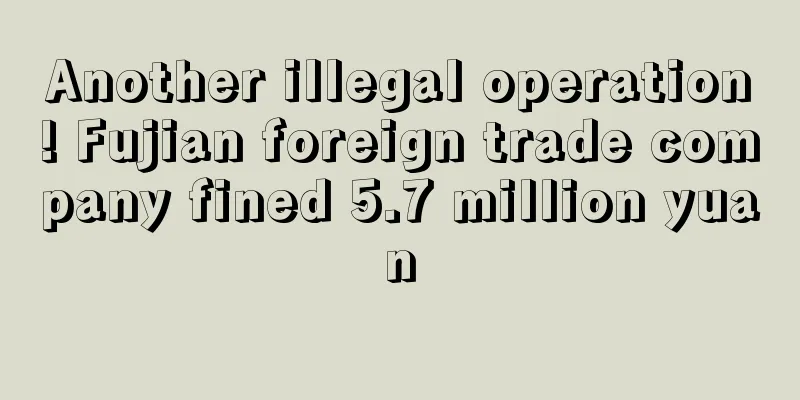Another illegal operation! Fujian foreign trade company fined 5.7 million yuan

|
In their daily operations, cross-border e-commerce companies must ensure that their tax payments are legal and compliant, otherwise they may face serious consequences.
Recently, news broke that a foreign trade company in Fujian was fined 5.7 million yuan for failing to pay customs duties, sparking heated discussions in the industry.
A Fujian foreign trade company was fined 5.7 million yuan for failing to pay customs duties
The U.S. Attorney's Office for the Eastern District of Texas issued an announcement stating that XXDA (North America) Corporation has agreed to pay a fine of US$798,334 (approximately RMB 5.7 million).
It is understood that the company was fined this time because it was suspected of falsely reporting the value of goods and failing to pay tariffs on furniture imported from China in accordance with regulations, in violation of the False Claims Act.
XX Da Company was founded in September 2001. The company is headquartered in Fujian and is mainly engaged in the development, production and sales of indoor furniture and office furniture. XX Da (North America) Company is the company's subsidiary in North America, mainly importing furniture from China and selling it in the North American market.
According to the U.S. Customs Law, all goods imported into the U.S. must be subject to import duties and other taxes. All import duties and taxes are calculated based on the value of the goods, i.e. the free on board price (FOB).
After the United States imposed additional tariffs on certain Chinese-made goods under the so-called "Section 301", XX Da (North America) Company falsely reported the value of imported goods in order to reduce tariff expenses.
According to an announcement released by the U.S. Department of Justice, from September 2018 to December 2022, XXDA (North America) was suspected of submitting forged invoices to the U.S. Customs and Border Protection (CBP) to avoid paying reasonable tariffs. The U.S. Department of Justice stated that this practice of forging invoices led to the underestimation of the value of goods imported into the United States, and the U.S. tariff revenue was affected.
U.S. Attorney Damien M. Diggs said, "Imported goods are essential to the U.S. consumer economy. Companies entering the U.S. market must comply with all laws and regulations on the import of goods, declare the actual value of imported goods, and fulfill their obligations to pay import tariffs. However, XXDA (North America) did not fulfill its obligations, and the relevant U.S. departments will strengthen law enforcement against underpayment of tariffs."
It is worth mentioning that the announcement of the US Department of Justice mentioned the whistleblower in this case. The final judgment showed that the whistleblower will receive a reward of approximately US$151,683.
Because the U.S. Internal Revenue Service ( IRS) has a whistleblower reward mechanism to encourage the public to report large amounts of non-compliant tax behavior. Whistleblowers can report through "Form 211" and apply for a whistleblower reward, with a maximum reward of 30% of the recovered tax.
A large number of tax evasion and tax fraud cases have been exposed in many places, and those with serious circumstances have been sentenced to 10 years in prison!
XXda (North America) Company failed to pay customs duties by falsely reporting the value of goods. Some illegal cross-border companies evade taxes and cheat on taxes through other means and face huge fines or even 10 years in prison.
Some time ago, an old seller who had been in business for 8 years in Guangdong was found by relevant departments to have concealed his income in order to pay less taxes. Many stores operated by this seller had committed illegal tax evasion.
The relevant departments discovered that the seller had evaded taxes by checking the seller's original electronic data of store orders, store revenue settlement data, invoices for store promotion fees and service fees, goods details and other information, and finally decided to impose a fine on him.
Tax evasion cases have occurred repeatedly. Previously, in Guangdong, a 7-year-old seller was found to have evaded taxes by relevant departments. It is understood that the seller paid employees' wages and year-end bonuses through Alipay or cash, but did not withhold and pay personal income tax as required by law.
Recently, a cross-border company in Liaoyuan, Jilin was found by relevant departments to be suspected of defrauding export tax rebates.
It is understood that the company used methods such as false VAT invoices, forged sales contracts, and false foreign exchange settlement to defraud export tax rebates.
In accordance with China's "Tax Collection and Management Law" and other relevant legal provisions, the Liaoyuan City Taxation Department recovered a total of 5.4879 million yuan in export tax rebates that the company had defrauded.
In the end, the company's main culprit, Meng, was convicted of the crime of defrauding export tax rebates and was sentenced to 10 years in prison and a fine of 5.5 million yuan by the court.
Tax evasion continues despite repeated bans. Recently, the Guangdong Higher People's Court released a case of smuggling and tax evasion through "brushing orders". Several sellers involved in the case were sentenced to 2 to 15 years in prison.
It is understood that in order to make profits in the past three years, three illegal sellers created false order, logistics and payment information to make them comply with the "three consistent orders" requirement of cross-border e-commerce platforms.
Then, they smuggled skin care products, cosmetics and other goods that should have been declared imported normally through the retail import channels of multiple cross-border e-commerce platforms in order to evade paying normal taxes.
According to verification by relevant departments, these three people evaded taxes of more than 20 million yuan by smuggling ordinary goods .
In the end, the three illegal sellers were sentenced by the court to fixed-term imprisonment ranging from 2 to 15 years and fined for violating customs regulations and illegally smuggling goods and items .
What’s even more outrageous is that some criminals even used drones to smuggle goods and evaded taxes by over 50 million.
It is understood that these criminals organized personnel to remotely control drones to fix ropes on relatively sturdy trees and other anchor points on both sides of the river, forming a "flying line" smuggling channel. Then, personnel pre-arranged at the border within Hong Kong used motor transmission and the terrain difference between Shenzhen and Hong Kong to slide and smuggle mobile phones into the country.
After verification by relevant departments, these criminals were suspected of evading more than 50 million yuan in taxes. In the end, the court sentenced the suspects to fixed-term imprisonment ranging from 1 to 10 years and fined them.
From the above tax evasion and tax fraud cases, it can be seen that some sellers use the method of "0 declaration" of domestic companies and "low declaration" of overseas customs declaration to evade taxes.
The collection accounts of some small and medium-sized cross-border companies are personal accounts. After registering the company, the company's income is not put into public accounts. The employees' salaries and commissions are paid through WeChat, Alipay, cash, etc. to evade taxes.
When it comes to overseas customs declarations, these unscrupulous sellers use methods such as falsely reporting the value of goods, unpacking goods for customs clearance in batches, and combining high and low tax rate products for customs clearance to achieve low declarations or even "zero declarations".
As tax issues become more transparent, the country is gradually escalating its crackdown on tax evasion and tax avoidance, and customs and tax bureaus are becoming more and more strict in enforcing inspections and penalties. Sellers must pay attention to this, conduct self-inspections early, make arrangements as soon as possible, and operate legally and in compliance with regulations.
Especially for cross-border e-commerce companies that have plans to go public or have already gone public, the financial information that has been disclosed or needs to be disclosed is linked to the company's tax issues. It is particularly important for companies to check their own tax issues and pay taxes in accordance with relevant regulations. After all, in today's big data era, business operations will leave a lot of data information, and the state can easily conduct tax inspections.
For sellers, paying taxes reasonably is the only way to ensure the stable and long-term development of the company. Never rely on luck. fine Violations |
<<: Another copyright infringement incident! Temu's T-shirt design is not authorized
Recommend
The boss showed off the use of AI and then laid off 90% of the employees. Netizens: Your company is hopeless
A few days ago, the CEO of an Indian e-commerce c...
What is Ardene? Ardene Review, Features
Ardene is a Canadian women's clothing brand he...
What is TTD Cross-border E-commerce Business School? TTD Cross-border E-commerce Business School Review, Features
TTD Cross-border E-commerce Business School is aff...
TikTok has become the favorite online shopping platform for young people here!
According to a report released by the Thai E-Comm...
Customs strictly checks! A large number of goods may be returned
What logistics situations have occurred recently?...
16-year-old high school student "cheats"? Selling game consoles on Amazon made $1.7 million!
During the epidemic, people around the world were...
The data of Alibaba International Station Procurement Festival is out, and the transaction volume of beach buggies has increased by 4000%!
Recently, Alibaba International Station released ...
No need to roll! Sellers on the US site can pay more attention to these potential categories
According to the latest data from market research...
What is LightInTheBox & LightInTheBox Review: Features, Pros & Cons, and Best Use Cases
LightInTheBox is a Chinese foreign trade B2C webs...
Shopping season "chaos"! These platforms may become the top winners
This year's holiday season has begun, and it ...
What is Klarna? Klarna Review, Features
Klarna was founded in 2005 in Stockholm, Sweden, w...
Formal wear is a hot-selling item on Flipkart
According to Flipkart's sales data for the pa...
What is SDS Customized Selection? SDS Customized Selection Review, Features
SDS Customized Product Selection (SDS for short) i...
What is Fengmaitong? Fengmaitong Review, Features
Fengmaitong is positioned as an intelligent stewar...
What is TradeMore & TradeMore Review
TradeMore is a product of Hangzhou Gangren Networ...









